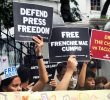The newly elected mayor of Cebu City has an innovative approach to crime control in this central Philippine city: A 50,000 peso (US$1,080) bounty for each “criminal” killed by his police force.
Mayor-elect Tomas Osmeña announced on May 16 that he would pay that sum to any police officer who “legally” kills a “drug lord, robber, or any criminal” in the line of duty. Osmeña didn’t specify how police would determine the legality of such killings or the identity of the suspects. He justified the bounty as an “extra source of livelihood” for Cebu City police.
Osmeña’s comments may only be post-election bombast. But he has a troubling history of exhorting summary killings of criminal suspects. During a previous tenure as Cebu City mayor in 2005, Osmeña told police: “Go ahead, pull the trigger. As mayor, my warning to anybody doing a crime is I will see to it that you’ll be dead on the spot. If we catch you, you will be so sorry – you won’t be around.”
Such comments constitute de facto official support for extrajudicial execution as a solution to the serious problem of violent crime in the Philippines. It’s an issue that’s not limited to Cebu. A 2009 Human Rights Watch report investigated several dozen of the hundreds of reported killings of people – some as young as 14 – by so-called death squads in Davao City in the south and other urban areas.
The Davao City model of targeted killings as a crime-fighting strategy appears to have spread to other cities in the Philippines including Toledo, Carcar, and Tagum City. Human Rights Watch research revealed in 2013 that Rey Uy, mayor of Tagum City from 1998 to 2013, created his own death squad to purge the city’s streets of hundreds of perceived criminals and those he referred to as the “weeds” of the city – drug dealers, petty criminals, and street children.
Osmeña is not alone in advocating violent and unlawful approaches to crime control. Rodrigo Duterte, who was elected president on May 9, made promises of extrajudicial killings of “criminals” a key plank in his political platform. That rhetoric lends a dangerous credence to a widely held view in the Philippines that only tough-guy, “Dirty Harry” approaches can remedy the country’s crime problem. But providing financial incentives for police to kill criminal suspects is merely a repugnant attempt to legitimize the secretive death squads. Filipinos, who over the years have made great sacrifices for accountability and the rule of law, should resist these moves by their politicians.





![[ANALYSIS] A different drug war](https://davaotoday.com/wp-content/uploads/2024/09/1000019103-110x100.png)




